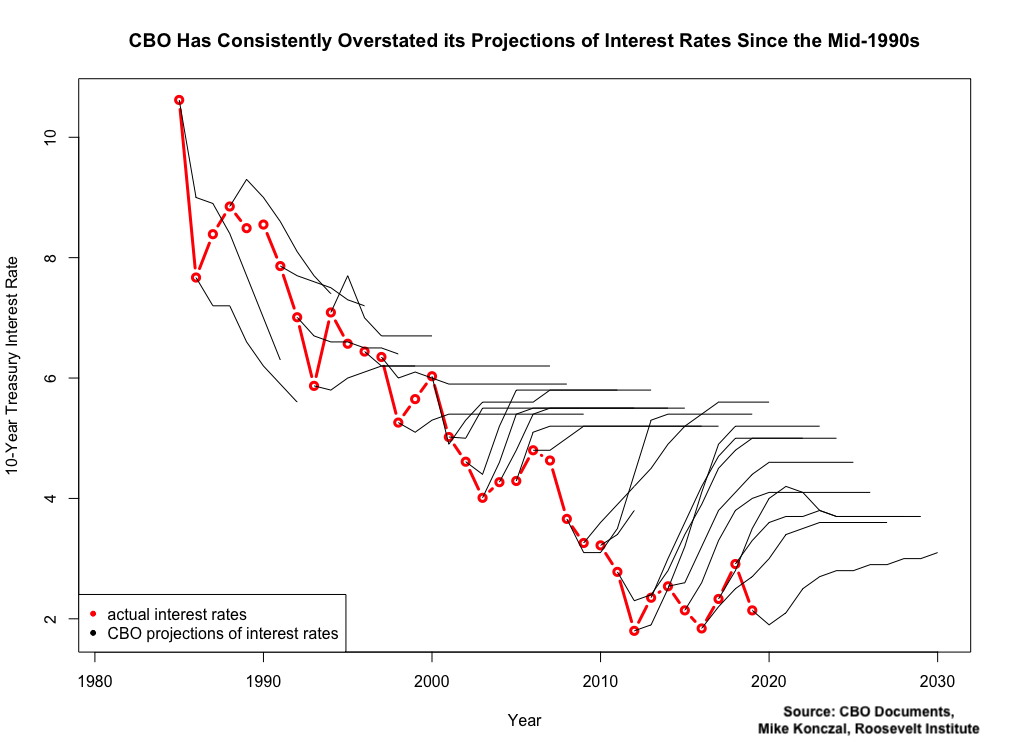The tyranny of the Congressional Budget Office
Democrats need to close their ears to this nonsense


A free daily email with the biggest news stories of the day – and the best features from TheWeek.com
You are now subscribed
Your newsletter sign-up was successful
America is in a full-blown economic depression, but Democrats are anxious about whether fixing it will cost too much. In the most recent economic rescue package — one the party itself admits is only a "messaging" bill, since it already gave away most of its leverage — Democrats scaled back their student loan forgiveness program and axed an idea for economic stimulus that would continue on autopilot for as long as the crisis lasts, because of scary possible estimates of the cost.
It's hard to describe just how blinkered this is. It's like a man who is drowning in the middle of the North Atlantic worrying about how flammable his clothes are. But there is a big reason aside from Democrats' knock-kneed cowardice this happens — the Congressional Budget Office (CBO), which informed Democratic leaders they would produce big price tags for both of the above programs. But as we'll see, their analysis is garbage. This agency exercises a tyrannical control over the parameters of spending discussions in this country, and slants them heavily towards austerity. Democrats should close their ears to this nonsense.
To begin, the CBO "scores" legislation by estimating its budget cost over a 10-year window. Right out of the gate this is a misleading way to do things. When thinking about the price of something, logically what one should consider is the qualities of the item relative to one's ability to pay. That requires additional thought in the case of the government, because it has the best credit in the world, and borrows in a currency it can print. For some proposed federal program, therefore, the wise place to start is not the headline figure of required spending, but the size of spending relative to the whole economy.
The Week
Escape your echo chamber. Get the facts behind the news, plus analysis from multiple perspectives.

Sign up for The Week's Free Newsletters
From our morning news briefing to a weekly Good News Newsletter, get the best of The Week delivered directly to your inbox.
From our morning news briefing to a weekly Good News Newsletter, get the best of The Week delivered directly to your inbox.
Instead the CBO window leads to reporters writing stories citing the 10-year figure without that critical context. ObamaCare has "a price tag of $848 billion over 10 years," wrote Robert Pear and David M. Herszenhorn in the The New York Times in 2009. Sounds pretty big! But what they didn't say is that total economic production would be something like $175 trillion over the same period, meaning the total spending would be on the order of one half of one percent of GDP — a minor program, in other words. (Mysteriously, military spending almost never gets the 10-year treatment in mainstream reporting, which would produce eye-popping sums. Instead one year is the standard.)
This practice in turn leads to absurd policy gimmicks to rig the 10-year window and make programs appear cheaper than they are. Most of ObamaCare's implementation was delayed for four years to keep the 10-year spending under $1 trillion. This led to four years of pointlessly delayed benefits, and allowed Republicans to falsely claim that the program's costs were exploding when later CBO estimates produced dramatically higher estimates (on the order of 1 percent of GDP) because they were including a whole decade of implementation. It's a ridiculous and childish way to design policy.
More importantly, it is basically impossible to predict the trajectory of either the economy or the price of state programs with any accuracy. The rate of interest on government debt, for instance, will hugely influence how much any program which ends up being funded by borrowing will cost. (The increase in the national debt during President Reagan's terms was almost entirely driven by interest payments.) But the CBO is not just wrong in a random fashion, overshooting sometimes and undershooting other times. Mike Konczal of the Roosevelt Institute has done preliminary work plotting CBO interest rate forecasts against what actually happened, and it turns out for 30 years straight they have consistently overestimated interest trajectories.

(Courtesy Roosevelt Institute)
A free daily email with the biggest news stories of the day – and the best features from TheWeek.com
This means all their interest payment estimates produced over that time were wrongly inflated, sometimes by a lot. The CBO itself ruefully admitted this mistake in a 2019 publication. Whoops!
The way the CBO treats spending categories is also bizarre. As Jon Walker writes at the People's Policy Project, it treats private health insurance spending as either public or private based on an arbitrary definition of how heavily the market is regulated. If the regulations are lax according to the CBO's crystal ball and bird entrails (meaning the insurance isn't very good), then government-mandated private premiums do not count as a tax. If they are strict, then they do count. This places an enormous bias against any kind of root-and-branch health care reform, because no matter how you design the policy the CBO is going to produce a gigantic price tag.
The student loan forgiveness cost cited above is similarly weird, because the government already owns almost all the loans in the country. It could simply cancel them outright without spending a dime — indeed, President Trump could do this tomorrow on his word alone. There would be less money coming in from future interest payments, but if Congress were to pass some appropriation to compensate for this, the government would just be paying the money to itself.
Perhaps the most preposterous CBO estimate of late, however, is the one about automatic stabilizers. These would be some kind of rescue policy that would keep going until the economy was back up to full strength — like continuing monthly stimulus checks so long as, say, unemployment was above 6 percent and inflation was below 4 percent. Speaker of the House Nancy Pelosi told reporters that she wanted to include something like this, but the threat of a big CBO score prevented her from doing so.
Nobody has a clue how long the coronavirus depression is going to last, which will determine how long stabilizers would be activated. So now we have the agency making up a score based on an arbitrary and probably wrong guess about how the economy is going to do, and ignoring the broader economic context at the worst possible moment. The thing about economic stabilizers is that they would almost certainly pay for themselves over the long term by preventing the economy from collapsing. In other words, their cost as a percentage of the economy will be negative, because without them output will be much lower. It's literally free money, and the CBO's cramped ideological perspective is preventing America from picking it up.
None of this is accidental. The CBO was originally set up in the 1970s by the late Alice Rivlin, a neoliberal deficit scaremonger who got her start as a sort of colonial viceroy over the District of Columbia, imposing austerity by fiat and coring out the city's political sovereignty. She positioned the CBO as a nonpartisan agency that would fairly adjudicate bills from both parties, and while it has produced damaging estimates about Republican bills, its bias is overwhelmingly against big social reforms. She inserted the agency in the center of budget politics as part of an ideological crusade against the national debt and social welfare programs, as David Dayen writes at The American Prospect. She's a person who worked with Paul Ryan on an appalling scheme to privatize Medicare.
It's hard to say whether or not Pelosi and company would behave any differently without the CBO — they could just be hiding their austerian preferences behind the agency. But this kind of thinking is going to do stupendous damage to a Democratic presidency if the party wins in November. If stabilizers aren't passed in the next few months, President Biden is going to burn up most of his political capital trying to get additional rounds of aid past Republican congressional obstruction. Democrats really need to stop worrying and learn to love big, beautiful programs.
Want more essential commentary and analysis like this delivered straight to your inbox? Sign up for The Week's "Today's best articles" newsletter here.
Ryan Cooper is a national correspondent at TheWeek.com. His work has appeared in the Washington Monthly, The New Republic, and the Washington Post.
-
 The ‘ravenous’ demand for Cornish minerals
The ‘ravenous’ demand for Cornish mineralsUnder the Radar Growing need for critical minerals to power tech has intensified ‘appetite’ for lithium, which could be a ‘huge boon’ for local economy
-
 Why are election experts taking Trump’s midterm threats seriously?
Why are election experts taking Trump’s midterm threats seriously?IN THE SPOTLIGHT As the president muses about polling place deployments and a centralized electoral system aimed at one-party control, lawmakers are taking this administration at its word
-
 ‘Restaurateurs have become millionaires’
‘Restaurateurs have become millionaires’Instant Opinion Opinion, comment and editorials of the day
-
 The billionaires’ wealth tax: a catastrophe for California?
The billionaires’ wealth tax: a catastrophe for California?Talking Point Peter Thiel and Larry Page preparing to change state residency
-
 Bari Weiss’ ‘60 Minutes’ scandal is about more than one report
Bari Weiss’ ‘60 Minutes’ scandal is about more than one reportIN THE SPOTLIGHT By blocking an approved segment on a controversial prison holding US deportees in El Salvador, the editor-in-chief of CBS News has become the main story
-
 Has Zohran Mamdani shown the Democrats how to win again?
Has Zohran Mamdani shown the Democrats how to win again?Today’s Big Question New York City mayoral election touted as victory for left-wing populists but moderate centrist wins elsewhere present more complex path for Democratic Party
-
 Millions turn out for anti-Trump ‘No Kings’ rallies
Millions turn out for anti-Trump ‘No Kings’ ralliesSpeed Read An estimated 7 million people participated, 2 million more than at the first ‘No Kings’ protest in June
-
 Ghislaine Maxwell: angling for a Trump pardon
Ghislaine Maxwell: angling for a Trump pardonTalking Point Convicted sex trafficker's testimony could shed new light on president's links to Jeffrey Epstein
-
 The last words and final moments of 40 presidents
The last words and final moments of 40 presidentsThe Explainer Some are eloquent quotes worthy of the holders of the highest office in the nation, and others... aren't
-
 The JFK files: the truth at last?
The JFK files: the truth at last?In The Spotlight More than 64,000 previously classified documents relating the 1963 assassination of John F. Kennedy have been released by the Trump administration
-
 'Seriously, not literally': how should the world take Donald Trump?
'Seriously, not literally': how should the world take Donald Trump?Today's big question White House rhetoric and reality look likely to become increasingly blurred
